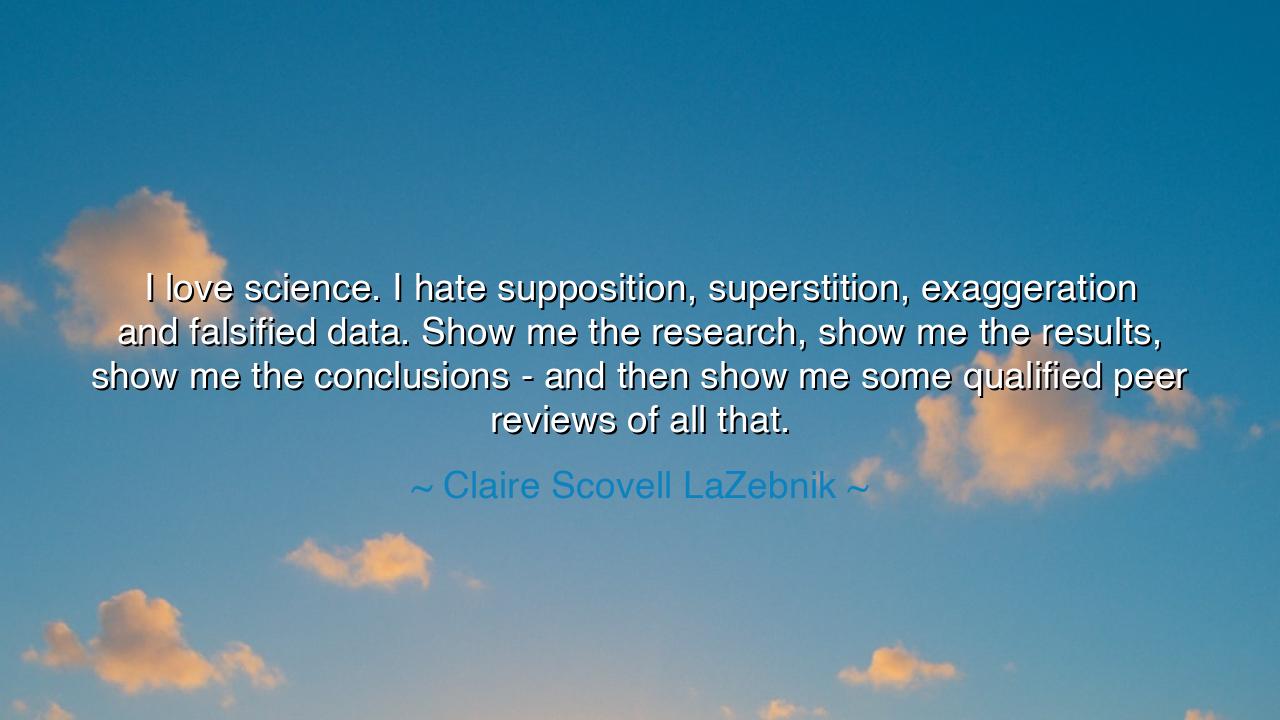
I love science. I hate supposition, superstition, exaggeration
I love science. I hate supposition, superstition, exaggeration and falsified data. Show me the research, show me the results, show me the conclusions - and then show me some qualified peer reviews of all that.






Hear now, O children of truth and wisdom, for the words of Claire Scovell LaZebnik are a call to arms in the battle against the shadows of deceit and half-truths. She declared: “I love science. I hate supposition, superstition, exaggeration and falsified data. Show me the research, show me the results, show me the conclusions - and then show me some qualified peer reviews of all that.” These words, though spoken in modern times, are steeped in the timeless principles of truth, integrity, and reason—values that have always guided the quest for knowledge. LaZebnik’s call is not merely a plea for evidence; it is a demand for clarity, for the rejection of falsehoods, and for the celebration of knowledge rooted in verified facts.
What, then, is the meaning of this call, O seekers of truth? LaZebnik speaks of the pure love of science, not the science tainted by the weeds of exaggeration and superstition. Science, in its truest form, is the pursuit of knowledge through reason, evidence, and testing. It is an ongoing process that requires rigorous inquiry, a process that does not allow the distortion of data, the clouding of conclusions, or the whispers of unfounded belief. She challenges us to look beyond the surface, to demand the hard evidence—the research, the results, and the peer reviews that validate the findings. Only through this unyielding commitment to truth can we be certain that the knowledge we seek is real, reliable, and beneficial.
Let us turn to the story of Galileo Galilei, whose devotion to the scientific method forever changed our understanding of the universe. Galileo, in his time, was faced with not only the resistance of the Church, but also the distortion of truth by those who clung to outdated beliefs. In defiance of superstition and authority, Galileo used his telescope to observe the heavens, uncovering facts that challenged the very foundations of geocentrism—the belief that the Earth was the center of the universe. His observations, though undeniable and grounded in empirical evidence, were dismissed by many in power. Yet, Galileo persisted, demanding that his findings be respected, and calling for the peer reviews that would validate his work. His battle for truth over superstition became the foundation of modern astronomy.
In our own time, we need only look at the field of climate science, where misinformation and exaggeration have led to confusion and debate. Scientists who have spent decades gathering data, performing experiments, and compiling results have often been drowned out by those who rely on speculation, misrepresentation, or political agendas. But the truth, as LaZebnik reminds us, is not found in the noise of falsehoods or the fervor of personal belief. It is found in the research, in the conclusions drawn from evidence, and in the peer reviews that ensure these conclusions are valid, reliable, and consistent with the world we live in. Science—true science—has no room for falsified data; it stands upon the pillars of honesty, accuracy, and openness to scrutiny.
In this light, LaZebnik’s words echo with the wisdom of the ancient philosophers—those who held that knowledge must be sought through rigor and intellectual honesty, not through speculation or illusion. The ancient Greeks, especially Socrates, believed that true knowledge was not easily attained, but required a process of constant questioning, debate, and scrutiny. Science, like philosophy, must be held to the highest standards, and we must challenge the falsehoods that seek to cloud our understanding. Just as Socrates demanded reasoning, evidence, and logic from those who would speak, so too must we demand the same from the modern scientists who shape our world today.
The lesson, O children of the future, is this: Do not accept knowledge blindly, but demand the hard evidence, the research, the results, and the peer reviews that validate it. In the pursuit of truth, there is no room for exaggeration, superstition, or falsified data. True science is built on the foundation of evidence, and it must always be open to scrutiny. In this age of misinformation, we must be vigilant and discerning, for only through the rigorous application of the scientific method can we ensure that the knowledge we possess is real and reliable.
Therefore, O children, as you journey through the world of learning, remember that the pursuit of truth is not a path for the faint-hearted, but for those who demand clarity, honesty, and evidence. Question everything, challenge everything, and seek the real knowledge that will serve not just your generation, but all generations to come. In the pursuit of science, let there be no room for the shadows of falsity or superstition, but only the light of truth that shines clear and bright, through research, results, and the scrutiny of qualified peer review.






AAdministratorAdministrator
Welcome, honored guests. Please leave a comment, we will respond soon